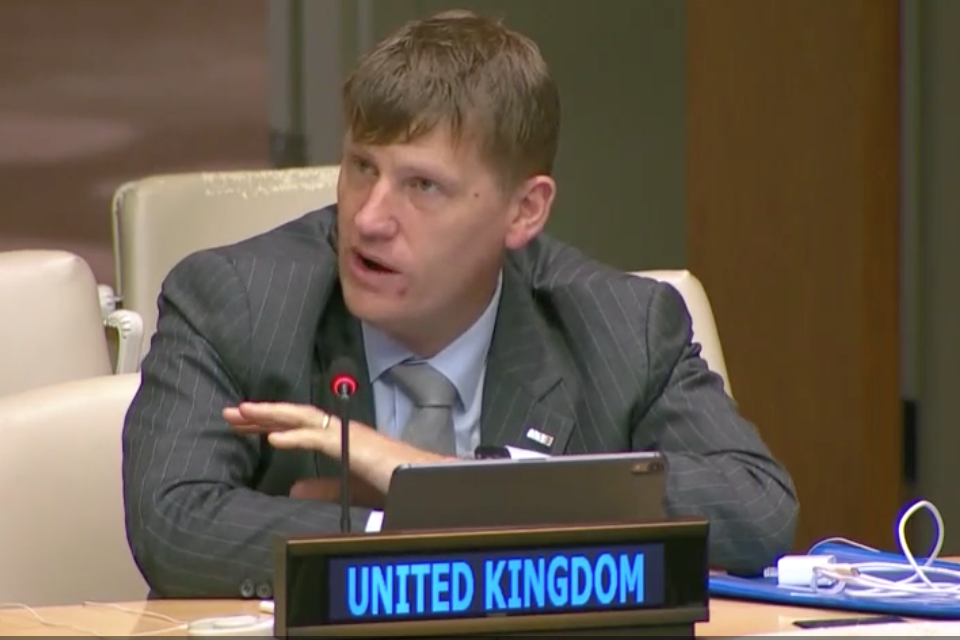Supporting the establishment of United Nations Integrated Transition Assistance Mission In Sudan
Statement by Ambassador Jonathan Allen, UK Chargé d’Affaires to the UN, at the Security Council briefing on Sudan and South Sudan.

Thank you very much, Mr President. And may I also thank, of course, Undersecretary Generals DiCarlo and Lacroix for their briefings. Let me also thank all those UN colleagues who are working very hard to get UNITAMS stood up and to deal with the ongoing issues there.
Mr President, despite competing priorities and indeed the complications and death toll from COVID-19, we’ve continued to see the civilian-led Government of Sudan take forward implementation of the key transitional benchmarks as set out in their constitutional document. And in particular, we welcome recent progress made on legal reforms which strengthen human rights across Sudan, as well as the appointment of civilian governors. And on the latter we welcome very much the inclusion of a number of women in these appointments.
That’s all very positive, but Sudan still faces, Mr President, a multitude of challenges. In the last year alone, the people of Sudan have had to contend with unprecedented flooding, with desert locusts and with the first polio outbreak in over a decade. Inflation exceeds one hundred and sixty percent and the humanitarian need, unfortunately, is increasing. COVID-19 has only exacerbated these challenges.
Mr President, it is clear that the Sudanese people cannot face these challenges alone, and it would be unreasonable for any of us to believe that. So the international community must step up.
The United Kingdom is playing its part. We have contributed over $100 million towards the family support program, which will help mitigate the negative impact of some of the necessary economic reforms being pursued by the Government of Sudan. And in 2020, the United Kingdom is donating an additional $76 million of humanitarian aid to UN agencies and NGOs to meet the most urgent needs of those affected by food insecurity, conflict and economic crisis in Sudan. But, Mr President, we must do more. Echoing the Secretary-General, I ask member states to consider not whether we can afford to support Sudan, but whether we can afford not to?
Mr President, once established, UNITAMS will be at the core of international support, working to ensure that it is coordinated and effective. And we urge the United Nations to work with the Government of Sudan to facilitate the swift deployment of this mission and crucially, to ensure that UNITAMS has adequate resources and a geographical presence to enable it to respond to needs on the ground and fulfil its mandate. And colleagues, we need to see the rapid appointment of an SRSG. We have waited for too long, and that delay is undermining the United Nations’ ability to support the people of Sudan.
Turning to the peace process, I want very much to commend the efforts and achievements of the Government of Sudan, under the leadership of Prime Minister Hamdok, and a number of armed movements to take forward negotiations despite the challenges of COVID-19. I want particularly to welcome the initialling of a peace agreement on the 31st of August by the Government of Sudan and the Sudan Revolutionary Front. It is a very welcome step towards a comprehensive peace deal for Sudan, and it’s an opportunity that we urge all parties to take advantage of through swift and full implementation of the agreement. We also reiterate our call to all of those who remain outside the peace process to engage constructively, immediately and without preconditions and to conclude swiftly negotiations on a comprehensive peace agreement.
Mr President, although we have seen progress towards efforts to secure peace, nonetheless, the security situation in Darfur remains concerning. The recent increase in inter-communal violence, civilian displacement and the ongoing conflict in Jebel Marra demonstrates the complexity of the drivers and root causes of conflict, which will need to be comprehensively resolved if we are to see a stable and secure Darfur.
I want to commend the work of UNAMID during these unprecedented times, not only in their assistance to the national response to COVID-19 in Darfur, but also their work with the Government of Sudan to support and bolster the protection of civilians. In this regard, I want to welcome the Government of Sudan’s National Protection of Civilian Strategy, which demonstrates their firm commitment to fulfilling their responsibility to protect. However, it will take time to build the required capacity and in doing so, we urge the Government of Sudan to build on their cooperation with UNAMID to ensure the protection needs continue to be met.
Thank you, Mr President.